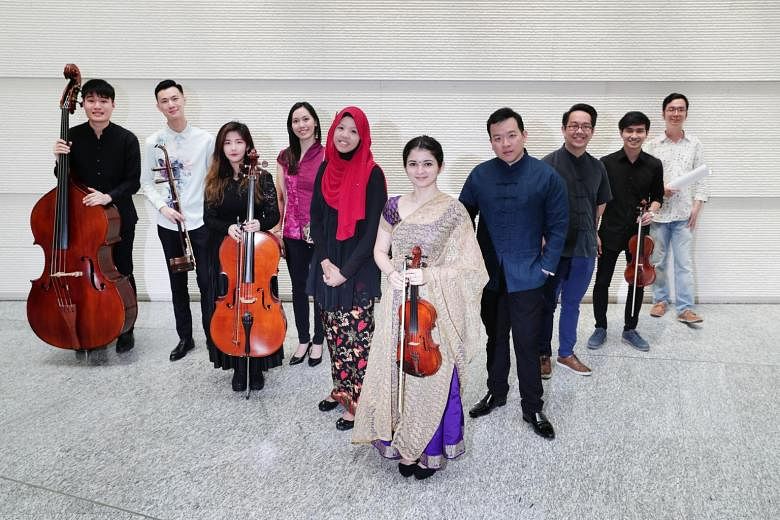SINGAPORE - At the homegrown Asian Cultural Symphony Orchestra (ACSO), musicians play instruments from different culturesto produce a different sound.
Take for example the Oriental Strings concert on May 10, which premieres a new composition by Singaporean composer Syafiqah 'Adha Sallehin, written for the erhu and the Indian violin.
"There's a musical conversation between these two different instruments that's like the camaraderie between two friends," says the 28-year-old composer. "It's exploring the elements of these two different musical cultures in a way that combines to create a new sound."
Championing Asian works, especially multicultural works, is one of the aims of the ACSO, which was started in 2016 by music enthusiasts from the National University of Singapore.
The orchestra is helmed by conductors Adrian Chiang and Dedric Wong who come from different musical backgrounds. Chiang, 40, was trained in Western classical music and works with chamber music group Resound Collective, while Wong, 33, is assistant conductor of Chinese chamber music group Ding Yi Music Company.
Wong says of the ACSO: "We intend to showcase the diversity of music in Singapore, to broaden the library of music here and broaden the audience."
Chiang adds: "Orchestras in Singapore focus on Western classical works so we want to champion Asian works. If we don't sell our own works, who's going to do it for us?"
The Oriental Strings concert is the orchestra's fourth major showcase and features about 80 musicians. Most works on the programme are Singaporean compositions, notably those showcasing stringed instruments.
-
book it / ORIENTAL STRINGS
-
WHERE: Victoria Concert Hall, 9 Empress Place
WHEN: May 10, 7.30pm
ADMISSION: $28 from Sistic (call 6348-5555 or go to sistic.com.sg)
On the agenda are Eric J. Watson's Building The Rainbow Bridge, a concerto for double bass with symphony orchestra; a new arrangement of Law Wai Lun's Prince Sang Nila Utama And Singa, and Wang Chenwei's Childhood, a melody for string orchestra.
Like many Singaporean composers, Wang, 30, was trained in Western classical music but writes for a variety of musical ensembles here, including Chinese orchestra. Childhood, written when he was only 16, is based on the pentatonic scale used in Chinese music and was initially written for the ruan (Chinese lute). He has reworked it for an ensemble that includes Western stringed instruments such as violins and cellos. "The main difference is that the richness of Western classical music comes from harmony, but in ethnic music it comes from the transitions between notes," he says.
Local musicians are inspired by the cultural diversity in Singapore but creating a multicultural work can be challenging. As conductor Wong says: "It's not just playing Rasa Sayang on different instruments. We're putting new sounds together."
For example, in the still untitled new work commissioned for this concert, Syafiqah aims to "explore the nuances of both soloists", even though erhu players use a different musical scale and different musical notation from musicians on the Indian violin.
Erhu player Rozie Hoong can read Western musical notation, but violinist Sharanya had to work with Syafiqah on translating the scores into Indian musical notation. It was hard work but worth it, says the 23-year-old, who only goes by one name. "The idea of playing with an orchestra does not exist in Indian music so I wanted to be part of a concert like this."
Similarly, Hoong, 34, says: "I've worked with orchestras before but this is the first time I'm working with an Indian violinist. It's really interesting to see how our traditional training comes together.


